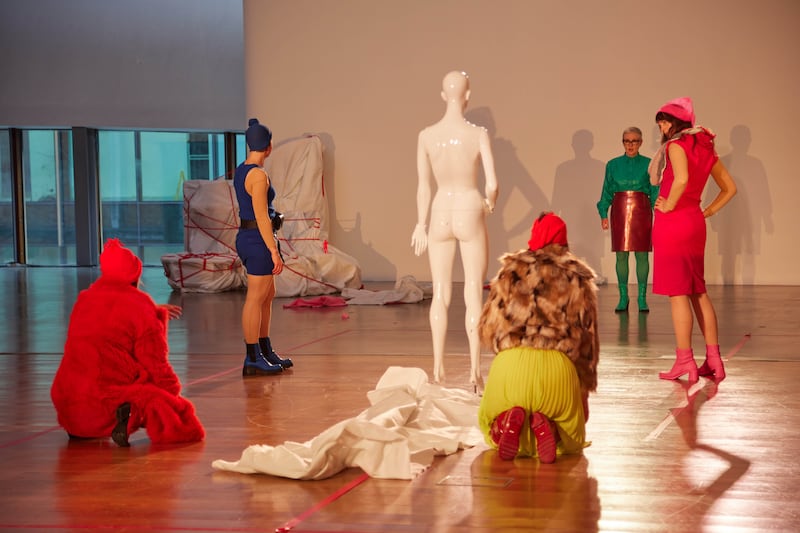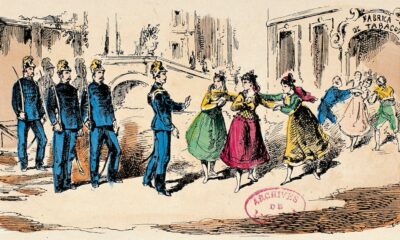Culture
I Fall Down, at Dublin Theatre Festival, is joyful, considered and very funny

Read more on post.
I Fall Down: A Restoration Comedy
Starts at Samuel Beckett Theatre, Trinity College Dublin
★★★★☆
If you’re prudish or uncomfortable with the frank contemplation of women’s anatomy, you won’t have booked tickets for this (unless you didn’t read the blurb or judge the play’s tone from the cheeky promotional image of Gina Moxley as a bubblegum-blowing classical nude statue).
Look away now, because there are lots of cunts here, including the “punnet of cunts” Moxley never finished sculpting as an art student in the late 1970s. Among other things, this reclaims the word for the thing it is rather than leaving it as an offensive term that we usually asterisk.
Moxley never did practise art; in this show the actor and writer considers her art education, enraged by women’s erasure in the prescribed history – Ernst Gombrich’s bestselling The Story of Art hasn’t featured a single woman artist through its 16 editions – and by the representation of the female form in classical statuary.
She has four sassy companions: the soprano Amy Ní Fhearraigh and the dancers Sarah Dowling (who choreographs with Emily Terndrup), Rachel Ní Bhraonáin and Maria Nilsson Waller. This fabulous five, in Sabine Dargent’s bright costumes, zip with chutzpah to right these wrongs: a restoration comedy.
The audience appreciates both the humorous polemic and the specialness of Trinity College Dublin’s spaces. We end up admiring each others’ vulvas before bringing 40 of them – relax: playdough, not flesh – outside to Trinity’s campanile, gently putting it up to (the statue of) the late provost George Salmon, who infamously declared that women would enter Trinity over his dead body.
None of this is embarrassing or disrespectful, and all of it is joyful, considered, informative – in 1543 the clitoris was dismissed as a “new and useless” discovery – and very funny, mixing lecture, dance, singing, caper, promenading, multimedia and art workshop under the stylish direction of John McIlduff.
Though first performed at the Crawford, in Cork, where Moxley studied art, this production is very specific to the history and buildings of Trinity (a partner here, via its drama department, and spearheaded by the Abbey Theatre, the Everyman, in Cork, and Once Off Productions).
We start in the Old Anatomy lecture hall, where generations of (mostly male) students studied the body; its scent, Moxley observes, reminds her of saddle and sausages.
Then we move to the rarely opened Old Anatomy Museum, a “bastion of testosterone”, where, surrounded by display cases of ancient bones and brains, we look down from the railed gallery. Ní Fhearraigh is on a slab below, horizontal, singing the names of women artists, strong and pure. It’s a stunning reclamation of women, both the artists her voice exults in and the centuries of women’s bodies dissected here.
Over in the Digital Hub some swish tech – lighting by Bill Woodland, music and sound by Kevin Gleeson, AV by Conan McIvor – allows Moxley to interact, amusingly and pointedly, with her 20-year-old art-student self and to visit Florence in 2020. There the sex industry’s underbelly is exposed by Covid, and she’s offended by the absence of female genitalia in classical statuary; no pudenda but Barbie crotches.
At the Galleria dell’Accademia di Firenze, home of Michelangelo’s statue of David, where “male artists defined lasting ideas of beauty”, they resolve to right that wrong with an amusing act of “completion, not destruction”, or “preservation, not vandalism”: a restoration of women in art.
This is achieved with delicious abandon and humour. As Moxley says, “representation is representation, at the end of the day.”
Runs, as part of Dublin Theatre Festival, until Sunday, October 5th













